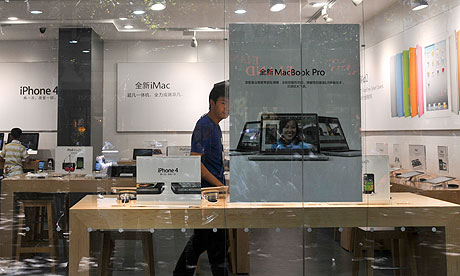This is a Fake Apple Store in China
There is a story circulating in the business press about a new case of blatant piracy in China – fake Apple Stores are cropping up all over China. For the past ten years since China was admitted into the WTO and obtained most favored nation status for trade with the US and other industrial nations, China’s economy has continued to prosper mightily with annual growth never dipping below 9% even during the worst of the 2007-2009 World Recession. In sum WTO memebership insured China continued economic prosperity at the cost of giving up restrictive trade practices, currency manipulation and intellectual property piracy.
And China has become the World’s manufacturing center at the expense of other developing economies in Cambodia, Malaysia, Mexico, Romania among just a few developing countries as well as developed countries in North America and Europe. Low wages and artificially low rate of exchange has allowed China to transfer through outsourcing millions of manufacturing jobs to China[US contribution – 5 million in the past 10 years].
What the Apple Fake Store issue raises is the question of China and its commitment to WTO trade policies. And the news is a continued mix of blatant defiance to clever manipulation by the Chinese. Take restrictive trade practices. China is using a variety of measures to limit imports into China and restrictions on foreign investment and ownership in China[for example, in a number of industries foreign ownership of Chinese companies is restricted to less than 50%]. In the arena of currency manipulation,China’s pegging of its currency to the US dollar has been the source of constant friction between the US and China. But it is in the area of intellectual property pirating that China irks not just the US but the World. And the fake Apple Store hits the sorepoint with a sledgehammer. And the Chinese government response – closing down two of the”Apple Stores” in a city where there are eight is typical of the official Chinese response to piracy – bend but do not yield to demands for better WTO-required and other IP enforcement. So, for example, Danish and German windpower generator makers are aghast at seeing their technology and designs appear in Chinese products while the Chinese start ups get large grants from governments
In general, China as the second largest economy in the World and growing at 2-3 times the rate of its European and US competitors, is constantly calling unfair and continued Western exploitation – harking back 50 to 100 years ago.Thus China still adopts a “poor beaten-down” attitude toward Western demands for controling piracy in electronics, software, manufacturing processes, etc. So it is much cheaper to ‘buy” knockoff software and systems in China then to pay the already pittance prices charged by foreign companies in China in areas like software, multi-media, and now big chunks of hardware. China is gaining the reputation of being pirates in business just when Chinese companies like HTC, Lenovo and Gilly are trying to make the transition to the opposite as World scale businesses.

